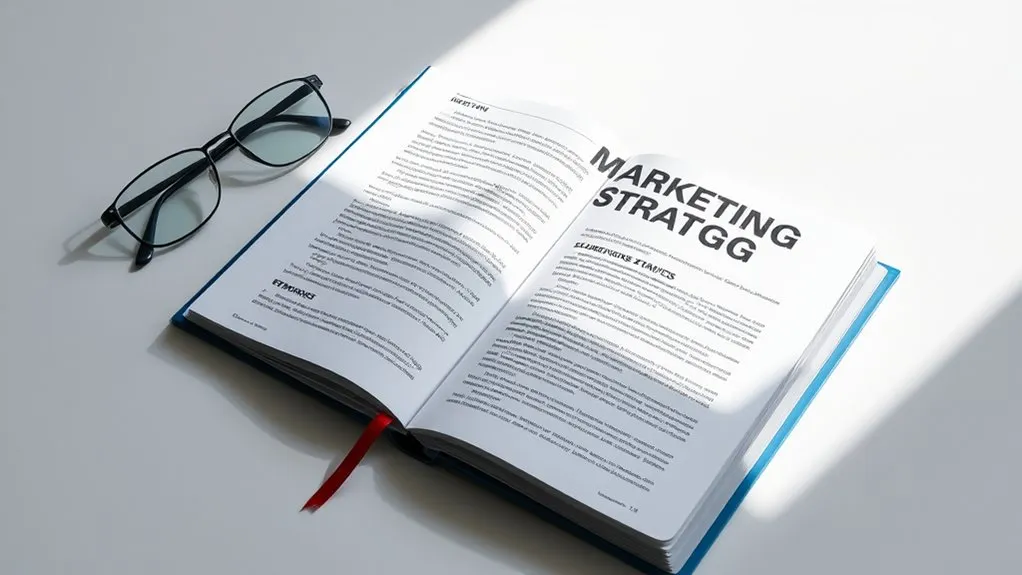Craft Killer Titles for Your MarTech White Papers (Because First Impressions Matter!)

You can't afford a weak title in the cutthroat MarTech landscape—your white paper's success hinges on that first critical impression.
Craft titles that strategically solve tangible business problems by understanding your audience's deep pain points.
Leverage data-driven insights, use precise language, and incorporate active verbs that signal immediate value.
Target specific roles with laser-focused messaging that speaks directly to integration challenges, data management struggles, and digital transformation needs.
By quantifying outcomes and avoiding generic hype, you'll create magnetic titles that compel prospects to lean in and discover game-changing solutions waiting just beneath the headline.
Key Takeaways
- Analyze audience demographics and behavioral patterns to create laser-focused titles that directly address specific marketing technology challenges.
- Craft compelling benefit statements using active language, quantifiable outcomes, and precise problem-solving messaging that signals immediate value.
- Integrate strategic keywords naturally by exploring audience search intent and using tools like Google Search suggestions to enhance discoverability.
- Implement A/B testing methodologies to systematically compare title variations, tracking performance indicators like download and click-through rates.
- Prioritize authenticity by avoiding marketing hype, using verifiable data and expert insights to build credibility and trust with potential readers.
Know Your Audience Deeply

Dive deep into understanding your audience by meticulously analyzing demographic segments and behavioral patterns that drive marketing success.
Your ability to craft compelling white paper titles hinges on developing razor-sharp audience personas that reveal nuanced demographic insights.
Start by leveraging tools like Google Analytics to dissect age, gender, and geographic data that illuminate your target market's core characteristics.
Segment your customers strategically, identifying which groups demonstrate the highest brand engagement and responsiveness.
Competitor benchmarking will help you uncover reactive audience segments that might otherwise remain hidden.
AI-driven measurement tools can provide comprehensive insights into audience behavior that traditional methods often miss.
Create detailed online personas by tracking website interactions, monitoring content consumption patterns, and utilizing topic analysis tools.
These personas aren't just abstract profiles—they're precise roadmaps to understanding how your audience thinks, behaves, and makes decisions.
Data-driven marketing insights provide a critical foundation for developing comprehensive audience understanding that goes beyond surface-level demographics.
Yabble's AI-powered analysis enables marketers to extract deeper contextual nuances from complex audience data.
Multi-channel tracking allows you to see which tactics generate the deepest impact on customer behavior.
By integrating real-time data enrichment tools like Clearbit, you'll gain unprecedented precision in targeting.
Your goal isn't just to know your audience—it's to anticipate their needs, predict their responses, and position your white paper titles as irresistible entry points into your most valuable content.
Solve Tangible Business Problems

Once you've mapped out your audience's intricate landscape, the next strategic imperative is transforming those insights into white paper titles that solve real-world business challenges.
Your titles must transcend mere marketing rhetoric and deliver practical solutions that address critical pain points in MarTech integration and data management.
Focus on articulating business outcomes that resonate with your target readers' most pressing concerns.
When you craft titles that promise to resolve integration challenges—which hamper digital transformation in 80% of organizations—you'll immediately capture attention.
Your white paper needs to demonstrate how you'll help them overcome data accuracy barriers, break down technology silos, and gain real-time data access.
Integration obstacles can significantly impede your organization's ability to leverage advanced marketing technologies effectively.
By targeting specific business problems like poor data quality, complex technology stack integration, or misaligned marketing measurement, you'll position your content as an essential strategic resource.
Your titles should signal that you understand their challenges and can provide actionable, unbiased insights that drive meaningful change.
For instance, 57% of marketers reported growth in MarTech applications, highlighting the critical need for strategic technology navigation.
Recognizing that current B2B marketing measurement practices often fail to capture true performance, marketers must develop holistic measurement strategies that provide comprehensive insights into marketing effectiveness.
Craft Compelling Benefit Statements

Magnetic benefit statements are the strategic linchpin that transforms white paper titles from forgettable marketing prose into compelling value propositions.
Your ability to craft empathetic messaging that resonates deeply with target audiences determines whether potential readers engage or scroll past.
Benefit differentiation isn't about listing features; it's about understanding and addressing your audience's core pain points with precision.
You'll want to quantify potential outcomes, using hard data and statistics that validate your claims.
By highlighting innovative technologies or exclusive services, you'll create unique selling points that distinguish your white paper from competitor content.
Research methodologies for understanding audience needs provide critical insights into emotional drivers that can elevate your messaging strategy.
Focus on outcomes that speak directly to your audience's strategic objectives. Use active voice and powerful action verbs that communicate immediate value.
Your benefit statements should demonstrate an intimate understanding of customer challenges, transforming technical details into clear, emotionally compelling narratives.
Contextual relevance helps establish deeper connections with potential readers by linking product benefits to their specific business needs.
Effective benefit statements require strategic language alignment that bridges the gap between technical information and human motivation.
Leverage social proof through carefully selected testimonials and case studies.
Validate every claim with credible evidence, ensuring your messaging builds trust while showcasing the transformative potential of your solution.
Leverage Strategic Keyword Selection

Strategic keyword selection transforms white paper titles from mere descriptive labels into powerful search magnets that draw your target audience directly to your content.
By conducting meticulous keyword analysis, you'll uncover the precise language your prospects use when searching for solutions.
Specificity helps readers understand the exact focus and value of potential content.
Your keyword strategy must go beyond surface-level research.
Dive deep into audience intent, exploring the specific phrases and terms that resonate with your target market's pain points and professional challenges.
Tools like Google Search suggestions and UberSuggest become your strategic allies in this process, revealing hidden keyword opportunities that can dramatically enhance your white paper's visibility.
When integrating keywords, precision is paramount. Incorporate them naturally into your title, ensuring each word serves a strategic purpose.
Avoid keyword stuffing or generic terminology that dilutes your message.
Effective titles require comprehensive understanding of audience search behavior and content expectations.
Instead, select keywords that authentically reflect your white paper's core value proposition and align with your audience's expertise level.
Compelling titles drive readership by strategically aligning with audience search behaviors and content expectations.
Ditch Generic Boring Titles

White papers are the unsung heroes of B2B marketing, but their potential dies the moment you slap on a generic, forgettable title.
Your title creativity is the first line of defense in audience engagement, and settling for bland, product-oriented descriptions will kill your white paper's impact before readers even open it.
Stop churning out titles like "Technical White Paper: Cloud Security" that scream boredom and reveal nothing.
These generic headlines fail to communicate value, solve problems, or spark interest.
You're not just selling a document; you're offering a strategic solution to critical challenges.
Instead, craft titles that instantly connect with your target audience.
Identify the specific problem your white paper solves, and make that the centerpiece.
Use language that speaks directly to IT managers, tech buyers, or whoever your ideal reader is.
A title like "The IT Manager's Guide to Preventing Cloud Security Breaches" immediately signals relevance and promises actionable insights.
Your goal?
Create a title that's a precision instrument, cutting through noise and compelling the right readers to dive deeper.
Test Title Effectiveness Ruthlessly

Every successful MarTech white paper demands rigorous title testing that goes far beyond gut instinct.
You'll need to approach title effectiveness with a strategic, data-driven methodology that leaves no room for guesswork.
Start by implementing thorough analytics that track multiple performance indicators.
Downloads, click-through rates, and engagement metrics will reveal your title variations' true potential.
Use A/B testing to systematically compare different title approaches, measuring how each resonates with your target audience.
Your testing strategy should incorporate both quantitative and qualitative insights.
Leverage SEO tools to understand keyword performance, while simultaneously gathering direct user preferences through targeted surveys and feedback mechanisms.
Look beyond surface-level metrics to understand why certain titles trigger higher engagement.
Don't just settle for surface data.
Dig deep into search rankings, analyze conversion rates, and benchmark your titles against industry standards.
Each title is a strategic weapon in your content marketing arsenal, and you'll want to optimize it ruthlessly.
Avoid Marketing Hype Traps

Marketing hype can sink even the most meticulously crafted white paper faster than a lead balloon.
The hype consequences are immediate and devastating: your credibility takes a nosedive, and trust erosion begins the moment readers detect exaggerated claims.
You can't afford to overpromise and underdeliver in the competitive MarTech landscape.
Prospects are razor-sharp, quickly identifying hyperbole that sounds more like desperate sales talk than substantive insight.
Your goal isn't to dazzle with flashy rhetoric, but to demonstrate genuine expertise through clear, evidence-based communication.
When drafting your white paper, prioritize factual, unambiguous content.
Use concrete data, expert testimonials, and verifiable customer stories that substantiate your claims.
Every statement should withstand rigorous scrutiny.
Avoid unattributed statistics and vague assertions that might trigger skepticism.
Your audience craves authentic, valuable information—not manipulative sales pitches.
They want to understand how your solution genuinely solves their challenges.
Refine Titles for Maximum Impact

Magnetic titles are the gateway to capturing your audience's attention in the competitive MarTech landscape.
Your title brainstorming process must be sharp, strategic, and laser-focused on audience engagement.
To refine your white paper titles for maximum impact, start by critically evaluating every word.
Each component should serve a specific purpose: identifying your target reader, highlighting a critical problem, and promising actionable insights.
Don't settle for generic language that blends into the background.
Precision is your ally in title crafting.
Use specific, action-oriented language that speaks directly to your readers' pain points.
Incorporate numerals or "how-to" phrases that signal concrete value.
Keywords matter, but they must feel natural, not forced.
Your title is your first sales pitch. It should immediately communicate who the white paper is for and what specific challenge it'll help them solve.
Avoid marketing fluff that sounds like empty promises.
Instead, create titles that demonstrate you understand your audience's complex needs.
A refined title doesn't just attract readers—it qualifies them, ensuring that only the most relevant prospects engage with your content.
Make every word count.
Final Thoughts...
Your white paper title is your digital knight, battling through information overload to capture your audience's attention. Like a strategic warrior, it must cut through noise, pierce skepticism, and win mindshare before a single page is read.
Sharpen your title-crafting skills, and you'll transform casual browsers into enthusiastic readers who can't wait to plunge into your Martech insights.
